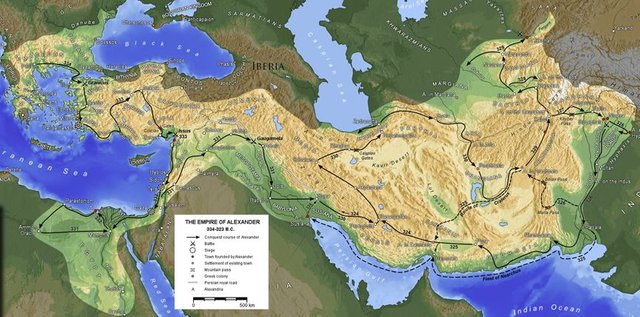In the spring, Alexander arrives in Gordion. According to legend, he smashes through here the Gordian knot, whereupon, according to an old oracle saying he should rule over all of Asia. Alexander, who always has an open ear for oracles, is satisfied. However, alarming news is mounting: the enemy fleet continues to threaten the coastal cities, and the Persians have succeeded in finding allies on the Greek mainland. Far more dangerous, however, is that Darius has put together a huge army and is now marching west with his soldiers.
Alexander decides to draw Darius. His plan is made easier by the fact that the Persians are taking no serious steps to defend their country. Their strategy has always been to face the attacker in open battle and then beat him with a numerically superior army. At first, however, it does not come to a meeting. While Darius crosses the Amanos Mountains in the area of Issos on a pass north, Alexander moves with his army on another pass south. When he realizes that he has missed the opponent, he commands immediate reversal.
Duel of kings
Alexander the Great, the young Macedonian and conqueror of Greece, against the Persian Empire and the experienced ruler Darius.
The opponents could not have been more different: On the one hand Alexander, a youth, just 23 years old. Although he was of royal descent, his native Macedonia was anything but a world power. His heir claims he had recently been able to prevail against numerous resistances bloody. On the other hand, Darius III, a good 30 years older than his challenger, a man with decades of experience in politics and warfare. As head of the Achaemenid dynasty, he was Great King of Persia, ruler of a world empire that stretched from Libya in the west to the Indus in the east, with infinite resources of people and material.
Certainly the brazen adversary from Macedonia could not be a serious challenge for him. But the starting point was more complicated than it appeared at first glance. Greeks and Persians had a long tradition of enmity, and again and again the numerically inferior Greeks had managed to fend off the Persian conquest attempts against all odds.
Neither Darius I nor Xerxes I had been successful in their invasion attempts during the First and Second Persian Wars. On the contrary, the battles of Marathon (490 bc), Salamis (480 bc) and Plata (479 bc) had ended in Persian defeat and averted the threat to the Greek mainland.


this is indeed very interesting and adds our insight about the history of post-quality thanks.
Downvoting a post can decrease pending rewards and make it less visible. Common reasons:
Submit